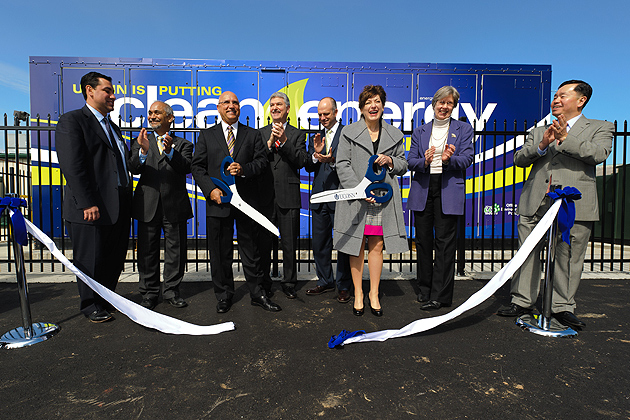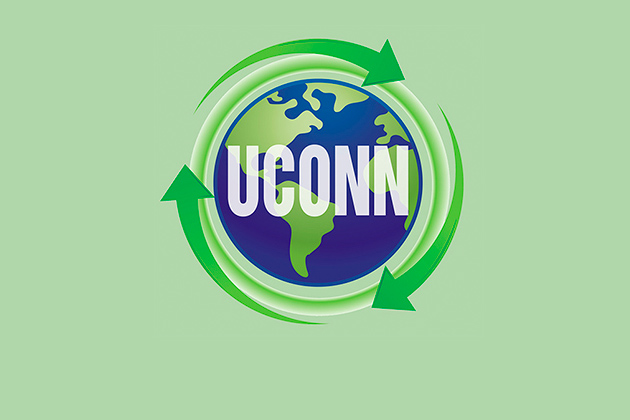A few months ago, the Sustainable UConn blog began 2013 with a New Year’s resolution of sorts, referencing an op-ed piece, written by four UConn scientists and published in the Hartford Courant, that called for leadership from then newly re-elected President Obama to address climate change. The blog post, “Accelerating to the Climate Cliff,” resolved that 2013 should be the year for policymakers in the U.S. and around the globe to do the same, before it’s too late.
The UConn group – Greg Anderson, Gene Likens, Bob Capers, and Mark Urban, the co-author of this article – had been leading a seminar for students in the fall on the role of science in American politics. Together with many of their colleagues at UConn and in higher education, and the overwhelming majority of the world’s climatologists, they had concluded that global warming presents a major threat to society and to nature. Yet they saw no national leadership on the issue.
At the time, the American media and politicians were focusing instead on the now forgotten fiscal cliff.
In the meantime, the climate problem has become more difficult to fix, and day by day we’ve come ever closer to the “climate cliff” – the point where we would be unable to reverse climatic changes without facing substantial impacts. The developing world’s thirst for cheap energy has led to more carbon-intensive, coal-fired power plants in Asia and India, where many products sold in America are manufactured. And extraction of shale oil and natural gas reserves, now made accessible through hydraulic fracturing – or “fracking” – of the overlying rock formations, has led to fossil-fuel booms in several states across the northern U.S.
So instead of cutting back on the use of coal, oil, and natural gas for energy and transportation, the world is still accelerating to the climate cliff. Just this May, our atmosphere crossed a dangerous milestone, reaching 400 ppm of CO2 for the first time in three million years.
Then suddenly it happened. Last week, the President delivered the much hoped-for speech on climate change. Standing in front of a Georgetown University crowd, mopping the sweat from his face on another sweltering day in Washington, D.C., Obama reinforced the scientific consensus that the global climate is changing dramatically and humans are driving that change. He spoke of the dangers our country faces if we fail to act now, such as sea level rise, hurricanes and floods, heat waves, droughts, and wildfires. He spoke of the increasing cost of our failure to act. Most importantly, he proposed that America should lead the fight against climate change. In his own words:
I am convinced this is the fight America can, and will, lead in the 21st century.

The President also laid out a plan to address climate change and its impacts. Like many Climate Action Plans, including UConn’s, Obama’s contains measures to cut carbon pollution, along with steps to adapt or “prepare for the impacts of a changing climate that are already being felt across the country.”
Importantly, he’ll use extant executive power through agencies like EPA, to drive implementation of this plan. This avoids the need for Congressional action and circumvents the inevitable political gridlock on climate change, which would, as always, be driven by the coal-mining and predominantly coal-burning states, along with other fossil-fuel interests. Politicians from those states and conservative pundits have already characterized the President’s plan as a “war on coal.”
If that’s the case, Connecticut has already paid an environmental and economic price based on the atmospheric transport of pollution into our state from coal plants in the Midwest and South. In effect, our state is at the end of the tailpipe, downwind from large coal plants that generate cheap power in other regions – and the regulatory costs of doing business here have been higher because of it. In a “war on coal,” our region stands to gain, not only in the costly battle against the effects of climate change, but also in terms of reduced smog and improved public health. Coal may have powered the Industrial Revolution in the mid-1800s but it has been an inconsequential part of the energy mix in Connecticut, and certainly at UConn, for many years now.

Instead, our state’s economic growth lies in advanced technologies that can forge a more socially and environmentally responsible future, as envisioned in Next Generation Connecticut, legislation that was recently signed into law by Gov. Malloy. NextGen is a $1.5 billion investment, over the next decade, in UConn and our research, innovation, and job-creation, through science, technology, engineering, and math (STEM) disciplines.
In addition, final design and construction of the Innovation Partnership Building on our North Campus – the first building in the UConn Tech Park – will begin soon. The building will incorporate clean and efficient energy sources, including smart grid, microgrid, battery storage, and other green sector technologies, that could well become cornerstones of the Tech Park. The President’s climate action plan will further align with and promote this kind of research, innovation, and economic development.
Now it’s time to do something that simply is not done enough, whether in politics or society in general: to say thank you when leaders do the right thing, especially when what they do is not the politically expedient thing. Although the plan falls short of our greatest expectations, it is a pragmatic compromise – an exciting and unprecedented commitment to climate leadership by an American president.
So thank you, President Obama. We are encouraged by your speech and the plan you set forth. For this week, we will celebrate and call it a victory, knowing that there are more battles ahead. You’ve inspired us to redouble our efforts and reassured us that climate action taken by UConn and hundreds of other institutions striving for carbon neutral campuses through the American College & University Presidents’ Climate Commitment, has not been in vain. Most importantly, you’ve reaffirmed our faith in the capacity of the United States to provide the leadership needed to avoid a global environmental crisis.
For archived Sustainable UConn blog posts, click here.



